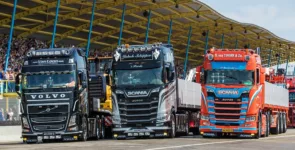The European logistics sector is undergoing a transformative phase in 2024, marked by rapid innovation, sustainability efforts, and the evolving dynamics of truck trading. As global supply chains recover from pandemic-induced disruptions, the demand for efficient transportation networks has surged across Europe. The trucking industry, a central pillar of logistics, has become a vital area of growth and technological evolution.
Among the European countries, the Netherlands stands out as a global hub for commercial vehicle trading, boasting thousands of sellers that contribute to the continent’s ever-expanding logistics network.
Key Trends in European Logistics
1. Green Logistics and Sustainability
One of the most significant trends in European logistics in 2024 is the industry’s shift toward green logistics. In response to increasing governmental regulations and customer demand for eco-friendly solutions, companies are adopting strategies that minimize carbon footprints. Many logistics operators are investing in electric trucks, hybrid vehicles, and other low-emission technologies. The European Union’s Green Deal and stringent emissions standards have compelled fleet operators to invest in sustainable alternatives to diesel-powered vehicles.
Notably, electric and hydrogen-powered trucks are making substantial inroads in the European market. Manufacturers like Volvo, Scania, and Mercedes-Benz are leading the way in developing commercial vehicles that cater to the rising demand for clean transportation solutions. As a result, fleet managers are gradually shifting to these greener options to align with EU-wide targets to reduce emissions by 55% by 2030.
2. Digitalization and Automation
Another key development in 2024 is the rise of digital solutions that streamline logistics operations. Automation, digital platforms, and advanced data analytics are playing an increasingly important role in enhancing operational efficiency. Automated freight matching platforms, real-time tracking, and digital documentation processes have minimized delays and improved transparency across supply chains. These innovations are particularly critical as companies strive to optimize the flow of goods amid labor shortages and growing demand.
Autonomous trucks, although still in the testing phase, are also drawing significant attention. While widespread deployment remains a few years away, countries like Germany and Sweden are making strides in integrating autonomous driving technologies into long-haul logistics.
3. Supply Chain Resilience
The COVID-19 pandemic highlighted the vulnerabilities in global supply chains, leading companies to rethink their logistics strategies. In 2024, businesses across Europe are placing greater emphasis on building resilient supply chains that can withstand future disruptions. This shift includes diversifying sourcing locations, regionalizing supply chains, and using digital tools to manage inventory and transportation networks more effectively.
Truck trading plays an essential role in this transition, with businesses needing reliable commercial vehicles to ensure the smooth flow of goods across European borders. This has fueled demand for trucks that offer versatility and reliability for long-distance hauling as well as last-mile deliveries.
The Netherlands: Europe’s Truck Trading Hub
In the heart of this booming truck trade lies the Netherlands, a country that has long been a major center for commercial vehicle trading. The Dutch logistics industry is well-known for its efficiency, infrastructure, and strategic position as a gateway to Europe. With one of the most advanced road networks and a well-developed maritime sector, the Netherlands is a hub for the distribution of goods across Europe.
1. Truck Trading Landscape in the Netherlands
The Netherlands has earned a reputation as a key player in the European truck market. Thousands of truck dealers and trading platforms based in the country offer an expansive range of new and used commercial vehicles. Dutch truck traders work with brands like DAF, MAN, Volvo, Mercedes-Benz, and Scania, facilitating the buying and selling of trucks across Europe and beyond.
Amsterdam, Rotterdam, and Eindhoven are prominent trading hubs where commercial vehicle sellers and buyers from all over Europe come to find their ideal trucks. Platforms like Truck1 and Bas Trucks, and Kleyn Trucks have cemented the Netherlands’ position as a go-to marketplace for high-quality commercial vehicles, whether it’s for construction, logistics, or specialized transportation, not to mention that trucks from the Netherlands have a track record of being in great demand.
2. The Role of Dutch Innovation in Truck Trading
Dutch truck dealers are at the forefront of adopting digital innovations in truck trading. Online platforms enable buyers to browse an extensive inventory of vehicles, compare prices, and complete transactions digitally. The use of blockchain technology is also growing in the truck trading sector, allowing for greater transparency and security in cross-border transactions.
Moreover, Dutch dealers are increasingly focused on meeting the growing demand for sustainable and electric trucks, positioning themselves as pioneers in green transportation solutions. As electric trucks become more mainstream, Dutch sellers are ensuring they provide a wide selection of eco-friendly vehicles to European buyers who are eager to meet new regulatory standards.
3. Exporting Trucks Across Europe and Beyond
The Netherlands also plays a critical role in exporting trucks across Europe and to global markets. Dutch dealers have the expertise and logistics networks to handle complex international transactions, making it easier for buyers from countries with less developed markets to access quality commercial vehicles.
The country’s strategic location, combined with its robust logistics infrastructure, enables Dutch truck traders to offer fast and reliable delivery across Europe. Whether for long-haul transport, urban logistics, or specialized sectors like construction, Dutch traders supply a wide range of vehicles to meet diverse market demands.
Conclusion
The European logistics and truck trading landscape in 2024 is dynamic and rapidly evolving. Sustainability, digitalization, and supply chain resilience are shaping the future of logistics, while the Netherlands solidifies its role as a key player in truck trading. With thousands of sellers offering an extensive range of commercial vehicles and embracing innovative technologies, the Dutch truck trading market continues to be a critical component of Europe’s logistics sector. As the industry advances toward greener, more efficient solutions, the Netherlands will remain at the forefront, connecting buyers and sellers and driving the future of logistics.
Written by Alan Parker








